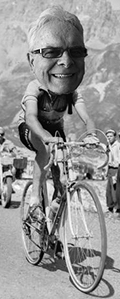Book Learning
 Mon, December 18, 2017
Mon, December 18, 2017 I hated school because I hated teachers. What was there to like? They were constantly abusing me physically and verbally, with their put downs, and telling me I was stupid. I realize now I was actually a bright kid, and my mind was constantly wandering outside what the teacher was telling me. Today I would have been labeled ADD, and medicated. Back then in the 1940s, I was beaten with a stick.
Through it all I had a feeling deep inside that, given the resources, I could build or make anything with my hands. When I left school and became an apprentice machine tool engineer, and I blossomed. No more boring book learning but hands on learning. Little “Tricks of the Trade,” not written in books, but passed on by showing. Later I would learn and develop my own “Tricks.”
 In 1952 at age 16, I began a 5 year engineering apprenticeship with a Swedish company called Skefco, (SKF.) in Luton, England.
In 1952 at age 16, I began a 5 year engineering apprenticeship with a Swedish company called Skefco, (SKF.) in Luton, England.
They were a ball and roller bearing manufacturer, and I worked in the shop that built the specialist machines for grinding ball races.
Rough iron and steel castings were shipped from Sweden, and machined at the Luton factory, and all the other parts were made from drawings, also sent from Sweden.
All measurement was metric, and I learned to work in millimeters and centimeters years before the metric system became standard throughout British industry. Micrometers measured 100th of a millimeter that was actually a finer measurement than 1,000th of an inch.
There is a huge difference between book learning and “Hands on Learning.” Book learning is working with the memory part of the brain. Remembering all the words and facts exactly as they are written. There is not much scope for free thinking.
Whereas, with hands on experience, although we had to follow drawings and specifications, along with extremely close tolerances. When it came to assembling the whole machine, it was a matter of following the drawing and figuring it out. If we couldn’t figure it out, we would ask someone who had previously figured it out.
Book learning is all about learning the rules. Hands on learning is often about making the rules as you go along. I carried this mindset over to my bicycle building. I discovered things were a certain way because that was the way they had always been. Even today I still see this trend continued in bicycle design.
Throughout the 1950s and 1960s I worked a wide variety of engineering jobs. I worked for an Aircraft Manufacturer, (Hunting Aircraft.) and for Vauxhall Motors, a division of General Motors at that time. I worked for a company that designed and built machines that made cardboard boxes, and machines that put things in cardboard boxes, and sealed them.
One time I worked for a Lithographic Printing company that had been in business since the early 1800s, before electricity. The printing presses were originally powered by a central steam engine that drove line shafts throughout the building. The steam engine was long gone, and the business electrified, but the old line shafts were still in place along the walls and in the rafters. These collected dirt and dust which dropped on the printing machines below. Part of my job was to dismantle and remove these.
In the mid-1960s I worked for a company called Harold Potter, in Nottingham, England. (Yes, I once worked for Harry Potter.) The company bought used cranes, refurbished and resold them. This was the realm of Heavy Engineering, and I learned a whole new approach. Using bigger hammers for a start. I supervised and worked hands-on during the installation of dockside cranes on rivers and sea ports, and indoor overhead cranes in steel foundries in Sheffield, England.
In the early 1970s I went to work for a farmer in Worcestershire, repairing farm equipment. My employer allowed me to use the workshop to build bicycle frames in my own time. This eventually led to my building frames full time in 1974.
When I left the bike business in 1993, I went to work for a company in Orange County, California, that manufactured Bowling Equipment, and refurbished bowling pin setting machines. I soon realized pin setting machines were nothing more than material handling devices. No different from a machine that places items in boxes.
All machinery and mechanical devices are basically made up of gears, cams, levers, belt and chain drives. Even todays computer controlled machines, the guts will be mechanical the computer replaces the human, setting the dials and pushing the buttons.
Writing this piece has brought back many memories, and a realization I have accomplished much outside the bike business. Accomplishments that I will probably never see again, but the memories bring as great a satisfaction as any bicycle frame I built.
It all stemmed from a childhood notion that I could build or make anything with my hands.




















Reader Comments (8)
I worked as a software tester for a while and one of the blokes I worked with said the best job he ever had was as a lathe operator. Something satisfying about working with your hands I suppose.
The English school system sure sucked in the 1940's. I grew up in the 1950's, in the U.S., and if a teacher did that, they would shortly be looking for a new job. My father was a Machinist, and could make just about anything from anything lying around.
Sorry to hear your teachers were so poor, but then it's the grain of sand that makes the pearl :-)
I grew up in Canada and had mostly good teachers, but apprenticeships had fallen out of fashion. At least we had a real "shop" class - where for three years of school we made electric motors, turned wood and metal on lathes (we also had shapers and milling machines - pretty well equipped). We disassembled small petrol engines and then raced to reassemble them and have them run. We did annealing, hardening and case-hardening. Great knowledge I still use, especially as I own two Land Rovers (Hammer = Tool #1 if that doesn't work, Get a Bigger Hammer :-)
A Modern Apprenticeship (its actual name in the UK) or NVQ (National Vocational Qualification) is part book and part theory. It can be college-based with periods of work broken by periods of classroom/shop training - or workplace based, with one day a week (or one week a month) spent on the "book" side.
All the big car manufacturers (VW, GM, Mercedes, BMW, etc.) follow a balanced approach with either their own training facilities or contracts with specific colleges. So much of a modern car is electronic and software-based that mechanical knowledge is only a small part of the job now. But the great thing about apprenticeships is that you automatically have a job once qualified. Academic learners have to go looking when they graduate and that is much more difficult. It's a shame the US can't understand this, but of course each state sets its own approach. And education is like a religion - everybody just *knows* their way is the best
When I visited your shop in 1984, I was 5 years into a Swiss Screw machinist career, the most precision lathes around, that took 10 years to become proficient. It was also the beginning of CNC.
For years, it was a good, middle-class living. Then, pay topped out at $30/hr. sometime around mid-1990’s, and never went higher. Today, I would never recommend a career in machining.
How ironic that the best machinists came from job shops, not union, where you learned everything from programming to toolmaking to maintenance. And, when you, Dave, left the frame business in the 90’s, it was also the end of machinists that could do everything.
We could never find any young people that wanted to learn machining. I now know it wasn’t only machining, but many other skilled occupations that lacked young workers willing to put the time in.
I also wonder just what our future will be like, when so many skilled people are gone.
After all, robots can do only so much. And knowledge isn’t just in books.
"It all stemmed from a childhood notion that I could build or make anything with my hands."
BEAUTIFUL ;-)
That is a seriously interesting and broad set of experiences, really impressive. People who have never worked outside an office haven't got a clue. The brain skills that go with this are the sort you can't learn in class and are far more than working with your hands. Teachers in those days were using the wrong rules, in both senses, the ones they impose and the units on the ones they measure with. Thanks for this.
I started as an apprentice machinist in a large east coast shipyard. I ran all kinds of machines but enjoyed the really big stuff most of all. I had really good grades both shop and academic so when I finished my apprenticeship they offered me a nice cushy office job in production control. I lasted six months. Most people would have loved it. I hated every minute of it. Just a pack of useless people practicing the worst sort of office politics. I begged my bosses to let me go back to my tools and finally they relented. That was nearly 40 years ago. I still make a living as a prototype machinist. I rarely do the same thing twice so I never get bored. It's a good job if you like to make custom bike trinkets also. When I see whats happened to the trade in the US I want to cry. We're losing a skill set that's going to be damned hard to get back.
And the guy with the book learning designed all those machines you were so proud of operating